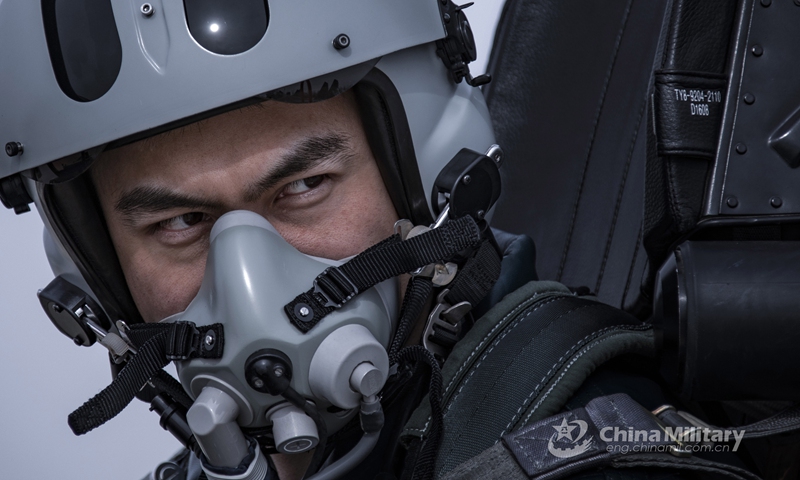
A pilot assigned to an aviation brigade of the air force under the PLA Western Theater Command keeps a close eye on his mock opponent during an aerial combat training exercise under complex electromagnetic conditions in early April, 2021.(Photo: eng.chinamil.com.cn)
The Biden administration's first arms sales to the island of Taiwan, featuring some howitzers, are proceeding, Taiwan media reported Monday, which sent a wrong and dangerous signal to Taiwan secessionists and "added fuel" to highly strained China-US and cross-Straits relations, Chinese mainland experts said.
But the experts pointed out that no matter what kind of weapons the island buys, the gap in the military capability across the Straits cannot be changed. The American Institute in Taiwan informed the separatist Democratic Progressive Party (DPP) that the deal of the M109A6 Paladin self-propelled howitzers will be submitted to the US Congress "soon" and the weapons are expected to be commissioned between 2023-25, Taiwan news website udn.com reported. It did not specify the amount of the equipment or value of the deal.
The alleged deal may become the first arms sales to Taiwan by the Biden administration, three months after Joe Biden took office.
There is no official confirmation about the sales from the US as of press time.
Observers noted the process of the deal comes earlier than previous US administrations, even the most "radical and provocative former Trump administration." Donald Trump's approval of the first arms sales to Taiwan, which totaled $1.4 billion, was released in June 2017 by the US.
Xin Qiang, deputy director of the Center for US Studies at Fudan University in Shanghai, told the Global Times on Monday that the early sales are in line with the Biden administration's strategy of visibly playing the "Taiwan card." The deal will meet few barriers at the administrative level.
Wei Dongxu, a Beijing-based military expert, told the Global Times on Monday that by selling arms to the island of Taiwan, the US is not only instigating Taiwan secessionists to create more estrangement and trouble between the Chinese mainland and the island, but also letting US arms dealers earn huge amounts of money.
Xin noted that the Biden administration, through the arms sales, wanted to show promises to the island, deter the Chinese mainland amid the intense situation and pacify the US' China hawks, but the action "added fuel to flames" when both cross-Straits and China-US relations are highly strained.
Biden has sent an
"unofficial delegation" of a former senator and secretaries of state to the island last week and
mentioned Taiwan in a joint statement with Japanese Prime Minister Yoshihide Suga, the first since Eisaku Sato and Richard Nixon's meeting in 1969.
After increasingly frequent Taiwan secessionist activities and US provocations, the PLA recently has been conducting nearly daily exercises near the island of Taiwan.
On April 12,
25 PLA aircraft including fighter jets and bombers reportedly entered Taiwan's self-proclaimed southwest air defense identification zone, the largest number of warplanes ever recorded. On April 5, the PLA Navy announced that
the Liaoning aircraft carrier task group was conducting exercises near the island of Taiwan.
Compared to the sales of 135 precision-guided cruise missiles during the former Trump administration, the deal of self-propelled howitzers, weapons more defensive in nature, is less provocative. But the mainland should be alert on possible sales of offensive equipment in the future, Xin stressed.
Though arms sales are usually announced by the US first, it is possible the DPP authority and Washington communicated ahead and arranged to let Taiwan media release the information first, Xin said.
Wei said that the report of the possible deal is an attempt by the DPP authority to showcase its "special" relations with the US in front of the mainland. But no matter what kind of weapons the island buys, the gap in the military capability across the Straits cannot be changed, Wei said.
While the possible deal will be the first time Taiwan purchases the M109A6 from the US, the island has previously received a number of M109A5s and M109A2s, which are previous editions of the M109 series howitzer. The udn.com report claimed that compared with them, the newer M109A6 is more powerful.
But Wei pointed out that because the island's military cannot seize control of the sea and the air, the self-propelled howitzers will only become live targets of the PLA in battle.
While Taiwan media claimed the M109A6 are the main howitzers used by the US Army, Wei said that the US Army actually has a decreasing demand for M109 series howitzers.
By selling second-hand equipment to Taiwan with a high price tag rather than weed them out directly, the US can spare funding to purchase newer weapons, Wei said.




